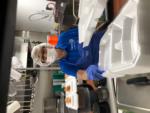
Sunday, April 26, 2020
By Nicola Barlow
Fighting hunger has been an important area of focus this year for our club so we were delighted to help serve hot meals to those in need at People Helping People in Hernando County on Sunday April 26th. We kept our social distance dressed with gloves and masks - and gave desserts and bread to all who attended. Pandemic or not the need is always there to help our residents.
Thursday, October 17, 2019
By Nicola Barlow
A donation from Spring Hill Central was used to construct two giant scrabble board games to celebrate Literacy Week. The event, hosted by Hernando Adult Education, was a huge sucess and was the first of its kind in the county.
Monday, October 14, 2019
By Nicola Barlow
The Rotary Clubs in Hernando County provide a dictionary to every 3rd grader in Hernando County schools each year - our club
had a fabulous morning chatting with 3rd graders at Challenger K8 - thanks to the teachers and students for making us so welcome!

Saturday, September 21, 2019
By Nicola Barlow
Helping out the UF Extension office on a beautiful Saturday morning cleaning up the coastline and park.
Saturday, July 27, 2019
By Nicola Barlow
Rotary Presidents from Brooksville (April Johnson), Spring Hill (Mike Prescott) and Spring Hill Central (Nicola Barlow) accept awards from the Parent Academy of Hernando County Schools for their clubs contributions towards the 3rd Annual Back To School Bash 2019.
Saturday, April 28, 2018
By
The Rotary of Club of Springhill Central meets on Thurdays at 12:15 PM at Silverthorn Country Club. Please join us.
Thursday, December 7, 2017
By
Rotary members in Harvard, Illinois, USA, have teamed up with community groups to help alleviate hunger and bring the community together.
By Arnold R. Grahl Photos by Monika Lozinska Videos by Andrew Chudzinski
Video: Community Garden
On a sunny morning in July, two dozen preschool children from Brown Bear Daycare inspect a bed of milkweed plants for monarch butterfly eggs, holding magnifying glasses to the underside of leaves in search of the tiny, off-white objects.
Curiosity stoked, the five-year-olds and their teachers move to the shade of a large tree to listen to a master gardener explain the role these butterflies play in gardens. The preschool class visits the community garden in Harvard, Illinois, USA, every Monday from spring to fall to learn about garden-related topics and even help out.
“They get to taste the vegetables, some that they have never even seen. They get to experience what it is like to plant a garden from the planting to the picking to the eating,” says Sheila Henson, executive director of the day care center and a member of the Rotary Club of Harvard. “At the end of the summer, we have a parent night where the parents come and get to see the different things their children have been involved with.”
With the goals of alleviating hunger and educating the community, master gardeners from University of Illinois Extension planted the garden in 2001 on a half-acre parcel donated by the city and adjacent to the public library. Over the years, the master gardeners have enlisted the support of many businesses, organizations, and clubs, including the Rotary Club of Harvard, making the project a community-wide effort.
As many as 250 needy families benefit from the 10,000 pounds of vegetables that are grown and donated every year to the local food pantry. The fresh produce serves as a safety net for many families.
Roughly a quarter of the community’s 9,200 residents live below the federal poverty line, a result of the limited employment opportunities in small farm towns across Illinois. The already fragile economy was further affected by the closing of a Motorola plant here in 2003 after only seven years of operation.
“In this community, the only way we can get by is by helping each other,” says Dave Decker, site director for the Harvard Community Food Pantry. “Everybody needs a little help now and then.”
read more
Wednesday, October 18, 2017
By

By Tom Purcell
She came home with a high temperature, feeling very ill. The next morning, her legs gave out when she tried to get out of bed. By that evening, she was so weak she could barely move.
It was 1951 when polio struck her. She was 12 years old, just starting the 8th grade. The nation was in a panic then. The ambulance driver wouldn't take her to the hospital for fear other patients might become infected.
Her father told her not to worry. He said she had a new virus and called it "Virus X." Her uncle had a car and he drove her to the hospital. She was placed in a ward with other children with polio. She found this odd. She told the nurse she didn't have polio. She had Virus X - just like her father said.
The nurse nodded, but said there was a possibility it was polio. Now she was really worried - worried about her family. She wrote her parents a letter. She hinted that she may have polio, but that she'd be OK. Her father cried aloud when he read it.
The Health Department quarantined her family. They posted a notice on the front door of her home. For two weeks, the life span of the virus, no one was to visit. Only her father could leave to go to work.
Within two weeks, the polio had ravaged her body. Her arms and legs were in various degrees of paralysis. She could barely lift her head. She was relocated to the D.T. Watson Home for Crippled Children in Sewickley, PA. Her long, painful rehabilitation would just begin.
read more
Thursday, November 30, 2017
By
Video: How Mobile Phones Help Fight Disease
Pakistan and Nigeria replace paper-based reporting with fast, accurate cellphone messaging
By Ryan Hyland Photos by Khaula Jamil
Mobile phones and simple text messaging may be the keys to victory in the world’s largest public health initiative: the eradication of polio.
As the disease retreats from the global stage, thriving in only a few remote areas in three countries, it’s up to health workers to deliver vaccines and share information with speed and accuracy.

Rotary and its partners in the Global Polio Eradication Initiative are strengthening the lines of communication by giving cellphones to health workers in Pakistan and Nigeria, where a single text message could save a life.
In Pakistan, Rotary has been working to replace traditional paper-based reporting of maternal and child health information, including polio immunization data, with mobile phone and e-monitoring technology.
read more